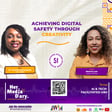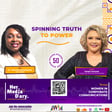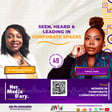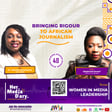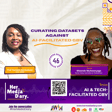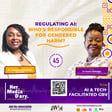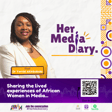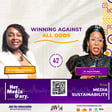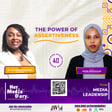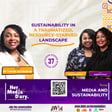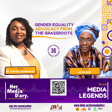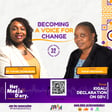
Her Media Diary Episode 3: Bassey Ikpi
It was a privilege to interview the writer, performer, and advocate Bassey Ikpi for the third episode of #HerMediaDiary podcast. We talk writing, finding yourself and mental health.
Bassey talks about her diagnosis of bipolar and her journey in developing a successful career. This interview was recorded in October 2018, and since then her book ‘I’m Telling the Truth, but I’m Lying’, was published and became a New York Times Bestseller. The book “explores her life--as a Nigerian-American immigrant, a black woman, a slam poet, a mother, a daughter, an artist--through the lens of her mental health and diagnosis of bipolar II and anxiety”.
I hope you enjoy this episode, I found Bassey open, honest and true. Her live journey and strength inspire me. I also share my experience with postnatal depression. Follow Bassey Ikpi on social media @basseyworld
Yemisi
About Bassey Ikpi
Bassey Ikpi embodies the brilliance of multifaceted creative minds. The writer, performer, and advocate is author of the instant New York Times bestselling book, I’m Telling the Truth, but I’m Lying (Harper Perennial 2019). Essence Magazine esteemed this debut collection of essays as “beautiful and compelling,” while Audible defines the writing as both “visceral” and “comforting.” The compilation, which went into a second pressing on the day of its release, has earned the mental health activist stunning reviews from readers and media outlets nationwide.
Whether written or spoken, Bassey is effortlessly clever--an alchemy of intellect, humor, and pathos. Appearing on stages and screens across the world as a public speaker and TV personality, Bassey first gained public acclaim as an internationally recognized poet. In a past life, she was a featured poet on HBO’s Def Poetry Jam and toured with its Tony Award-winning Broadway show. Also an active voice in pop culture commentary and the mental health community, Bassey has been published by The Root, Huffington Post, and Essence, as well as in anthologies including Rookie On Love from acclaimed editor Tavi Gevinson. Bassey has also been commissioned by Nike’s global nonprofit Girls Effect, writing and performing the short film, Invisible Barriers.
As the founder of The Siwe Project, a mental health organization, Bassey also created the global movement #NoShameDay, an initiative that aims to reduce stigma and increase mental health awareness.
Bassey is represented by UTA for film and television
